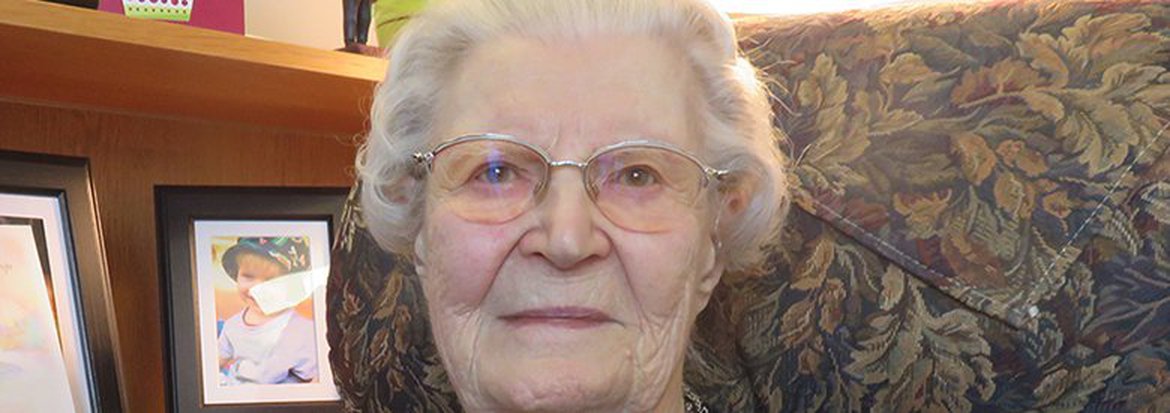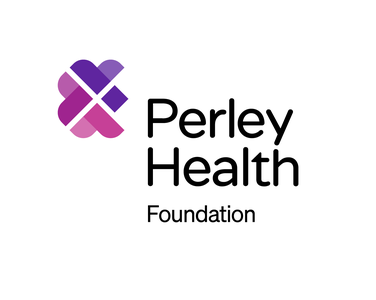A Blessed Life

Read about Edith Goodspeed in the Spring 2018 edition of the Foundation newsletter Honour and Care
Several birthday cards adorn Edith Goodspeed’s room at Perley Health, marking her recent birthday. “This was number 99,” she says with a smile, “for all my future birthdays, I won’t count any higher…I’ll just stay 99.”
Edith has certainly earned the right to lie about her age. As a Nursing Sister in Englandduring the Second World War, she experienced the horrors of Nazi bombing and helped countless soldiers recover enough to return home or back into battle. She later raised three children and today is blessed with seven grandchildren and two great grandchildren.
Born in 1919 as the second child of a farm family in Rosetown, Saskatchewan, Edith Mary Ferrall was named after her aunt. Edith’s father died before she was three; her mother sold the farm and raised Edith and her brother Arthur in Cypress River, Manitoba.
“My parents both worked hard and did a lot for the community,” she recalls. “I remember Dad organizing baseball games and inviting the players home afterwards for some of Mom’s homemade cake.”
After high school, Edith trained as a nurse at VictoriaHospital in Winnipeg and upon graduation took a job with the city’s public-health department. Like many young people, she applied to serve the war effort soon after Germany invaded Poland. Edith finally got the call on in 1943 and served at military hospitals in Winnipeg and in Brandon, where one day she was assigned to care for a brash young officer named Donald Goodspeed.
“He had broken his ankle while training to drive a motorcycle at night with no lights on,” says Edith. “He had already served overseas and returned to Canada to earn his commission. He was a difficult patient, though, because he wouldn’t stay in bed.”
As a Nursing Sister, Edith outranked Donald and threatened to put him on charge if he didn’t behave. She also convinced him to eat his vegetables. Six weeks later, they married. “It was an exciting time, with troops moving in and out constantly, and we never knew how long anyone would be around,” says Edith.
Shortly after their wedding, Edith was posted to England and served at various hospitals for the duration of the war. Donald followed soon afterwards and saw action in Italy, Holland and Germany.
When Edith learned that they wouldn’t send married nurses to the front lines, she was bitterly disappointed. Nazi bombing raids, however, soon brought the front to her doorstep. During one attack, a huge bomb fell into the courtyard of the Surrey hospital where she worked. “Thankfully, it didn’t explode, because many of us might have been killed,” Edith says. “I was in the hallway and all of the lights were off because of the raid. I heard the whistling as the bomb fell, and then the thud as it hit
the ground. Some soldiers came quickly and defused it.”
Edith visited London several times during the war and was touched to see mothers making beds for their children in the subway, where they would go every night to avoid Nazi 1944 bombing. Despite these experiences, however: “I don’t remember ever feeling afraid,” she says, “we knew we were going to win.”
After the war, Donald completed a degree at Queen’s University, then reenlisted and the family lived on various bases across Canada and around the world, including a 14-month stint at Defence Services Staff College in Wellington, Tamil Nadu, India. The couple raised three children – a girl and two boys – and settled in Ottawa, near Canadian Forces Base Rockcliffe.
Edith worked as a nurse first at the Base hospital, then at the Base school. Donald became a distinguished military historian; he taught at Carleton University, wrote several books and eventually retired as a Lieutenant Colonel. Both volunteered: Edith taught home nursing to Girl Guides, awarding merit badges to those who passed the test, while Donald served on the Parent Teacher Association.
“It was a tight-knit community,” recalls daughter Maureen Goodspeed. “Everyone knew one another and we couldn’t get away with anything.” Soon after Maureen, the eldest, left home, Donald accepted a job with Brock University and the family moved to Niagara-on-the-Lake. The children went on to successful careers: Maureen in the public service; Peter as a foreign correspondent with the Toronto Star; and Michael as an author and officer in the Canadian Forces.
After Donald passed away, Edith regularly hosted children and grandchildren in Niagara-on- the-Lake. Her daughter later convinced her to move back to Ottawa, where she continued to live independently until her health began to fail.
She has been impressed by the staff at Perley Health, and attends church services and exercise classes regularly. “I’ve been very lucky to have such a blessed life,” she says simply.

